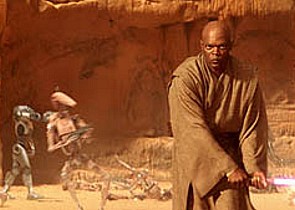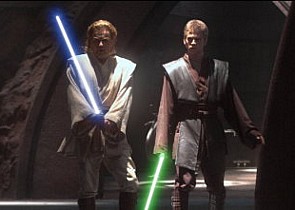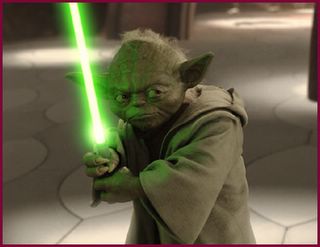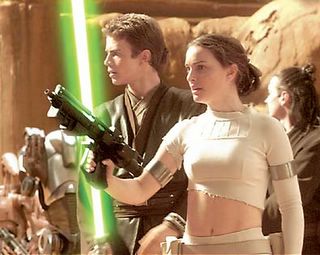Star Wars Prequels Reconsidered, Part the Second

Welcome to Part 2 of this very special Star Wars column. For those of you who missed Part 1, in which I reconsidered the overall atrociousness of The Phantom Menace, feel free to peruse its contents right here.
Several people commented to me that Part 1 of this column was very long, and that this, by extention, proves me to be some kind of massive uber-dork, such as would write a tremendously long column on their blog about a film wherein the main character was an obnoxious pseudo-Rastafarian reptile man. So, okay, I'm a nerd. You got me. But I grew up with these movies (okay, not these exact movies, but you know what I mean), and I'm sorry if I feel the need to pontificate on their significance and overall quality at length.
Okay, putting the outside commentary out of mind, let's take another look at Episode II: Attack of the Clones. When it was first unveiled to the world three years ago, the reception was considerably warmer than Phantom Menace. Fans enjoyed the little details and references thrown in for their benefit (culminating with the big Yoda fight), everyone enjoyed the mercifully faster pace, and even allowances were made for the cheesy romantic storyline.
At the time, I felt certain that, while still not a good movie by any means, Attack of the Clones was at least superior to its predecessor. And, to be honest, after taking another look at the film on DVD (for the first time!), I'm not sure it earns its reputation. Though I can say I was somewhat more entertained by Clones than the often-slack Phantom Menace, I don't think it's a better film.
It's a messier film, that's for certain. These's a schizophrenia to Lucas' direction here, and also a good dose of confusion. I couldn't shake the feeling throughout the movie that we were never focusing on the most salient parts of the story. Everything important happens off-screen, every major plot development occurs behind-the-scenes, so very often as viewers we find ourselves playing catch-up. Even at the very opening of the movie, we know very little...Attempts are being made on Padme's life, an unseen guy named Count Dooku's doing...um, something...and Anakin's upset about some stuff that happened between Phantom Menace and now.
Why would Lucas design his prequels this way? It still makes no sense to me. We could be watching such a sensible, straight-ahead adventure film storyline. A story about a child slave who learsn about The Force, who loses control of his powers and falls to the Dark Side, and who ends up destroying everything he once prized and held dear. Instead, we get a slog through trade negotiations, pod races, pointless mysteries about clone armies, arena battles with oversized insects and endless, soft-focus "romp in the grass" love sequences.
Honestly, the second half of Attack of the Clones is the most nonsensical, choppy and muddled of Lucas' entire directorial career. It feels as if he was desperately throwing stuff into his script and hoping it would add up in the editing room.
I'll give you an example. Anakin and Padme have decided, against the orders of the Jedi Council, to go to Geonosis to rescue Obi-Wan, who has trailed a bounty hunter named Jango Fett there. Okay, fine so far. When they arrive, they realize it was a trap set by the villainous Count Dooku. He takes them into an arena where they are to fight beasts, gladiator-style, for a bunch of indistinctly-animated insect aliens.
First off, this whole scenario comes out of left field. We have no grounding here. Who is Count Dooku? How does he relate to the action we have seen thus far? Who are all these people with him? We understand they are "The Separatists," but the movie hasn't adequately explained their connection to one another, what they hope to get out of "separating" from the Galactic Federation, and most of all what they have to do with Anakin, Padme, Obi-Wan and the action of the movie.
So it's already too muddled to be dramatically interesting. Okay, fair enough. But it gets even more strange.
During the battle against the monsters, heroic Jedi Mace Windu arrives to save the heroes. A few moments later, when his life is threatened, an entire clone army, led by Yoda, literally drops into the arena to save the day. And once all the heroes escape the arena and head out into the world, they see that an entire massive battle is underway. This is the beginning of the Clone War, we are to understand.
But what is actually going on? Why is there a battle? What is the strategic purpose of taking Geonosis? Where is Geonosis, what's there, why does it matter?
Does Lucas even understand how wars are fought? He's currently set to premiere his sixth film with "wars" in the title, but this story is barely coherent. I can understand Yoda showing up with some troops to save the Jedis who are trapped in Dooku's net. But why bring all these battallions, and start fighting droids on the planet? What's he hoping to do?
After the main action of this section of the film is complete, with the requisite indecisive lightsaber duels, it is simply announced that the battle has been won, and that the Clone War is underway. What happened? What has been accomplished? Anything? And don't these brilliant Jedis think that a mysterious, unexplained Clone Army that has just been given to them might be a little too convenient?
So, okay, the movie's all over the place at once. It's a jumbled, confused, plotless fiasco on almost every level. But is it entertaining? Does it work as a Star Wars film?
Not really. There are two action sequences that come together well. The first comes early - a flying car chase through Couruscant, the planet that's just one massive city. The effects are terrific during this scene, which really captures the fantastic speed of the chase and the improbable physical dynamics of the flight. The sequence also highlights Anakin's growth as a Jedi, which will be essential if we are to believe in his transformation into Darth Vader, the universe's largest badass.
The second great action set piece occurs when Obi-Wan trails Jango Fett through an asteroid field. Fett makes use of a truly interesting weapon - sonic charges. Everything goes silent for a moment as they explode, and then a massive sonic wave proceeds to shatter everything in its path. This whole segment is a triumph of sound design and CG effects work. Brilliant stuff. It's the best material in the entire movie.
Much has been made of the terrible dialogue, and some of it is truly atrocious, but I think if the entire film was telling a more interesting, passionate story, the actors would have an easier time expressing some of these sentiments. Natalie Portman and Hayden Christensen don't generate any genuine sparks, but their love story is so tortured, it would take a miracle to make it work anyway.
I mean, think about it. They're asked to play a couple who haven't seen each other in a decade, since one of them was a small child. They have to go from awkward half-conversation to unrequited affection to full-on passionate true love in a matter of a few scenes, while reciting dialogue along the lines of the following:
"I hate sand. It's rough and course, and it gets everywhere. Not like you. You're soft."
Ugh and double ugh. So, yeah, getting any Han-Leia style chemistry is just not going to happen. Honestly, I think too much has been made of this particular downfall of the movies. The love story's not really crucial. These aren't movies about Anakin-and-Padma and weren't they a cute couple...They're about Anakin the Jedi and how he became Darth Vader the Sith, and if that storyline holds up, the others will fall into place. Just like Luke's transformation from country boy to Jedi overshadows some of the weaker aspects of the original trilogy. Like Ewoks.
But the Anakin material here's just kind of desperate. You sense that they want him to have gravitas, to believably be powerful and tempted to use his power for evil. But, as played by Christensen, he's far too petulant and whiny to be intimidating. And his grudge against Obi-Wan seems more than a little inflated for the actual situation.
I think Lucas just has trouble getting too dark on us. Whenever Anakin and Obi-Wan are together, he wants to give them funny, riffing kind of comic dialogue, to inject some sense of fun into the movies. And that's fine. Admirable, even. But then, he wants to develop this tension between the characters as it suits the story. Is Obi-Wan really holding Anakin back? How? He seems pretty supportive during the movie. Again, we can assume this stuff is happening off-screen, but why not show it? That's the material the whole movie's supposed to be about.
Oh, and one more major point I need to make before shutting this thing down...Lucas needs to stop violating the rules he set up in the initial films when it suits him. I just spoke in my White Noise review about how agitated it makes me when filmmakers violate the rules of their cinematic universe for the sake of convenience. In White Noise, the ghosts develop different abilities depending on their situation and the needs of the story. In Attack of the Clones, Jedi and their opponents become more and less powerful in different situations.
Sometimes they have phenomenal psychic powers, seeing things happen in different rooms or even far-flung reaches of the galaxy. And sometimes they can't tell when major things are happening in the next room. Sometimes they can knock an entire group of droids off their feet using only a wave of their arm, whereas other times they have no defense against two droids with blasters drawn on them.
But most obnoxiously, Lucas breaks the rules of The Force he established long ago in A New Hope and Empire Strikes Back. Most egregious? Yoda's abillity to move objects with his mind.
In Empire Strikes Back, an older and weakened Yoda on Dagobah lifts Luke's X-wing out of a swamp with relative ease. When Luke asks how such a thing is possible, Yoda reminds him that "size matters not."
What does this really mean? It means that The Force is about a level of concentration and mental strength, not about the size and shape of the objects being manipulated. So Yoda could move anything, provided he could quiet his mind sufficiently and had a close enough bond to The Force.
But in Attack of the Clones, he's struggling to keep objects afloat during his fight with Dooku. He's able to flip around, defying gravity, with a lightsaber, which certainly seems impossible because of his limp and constant use of a cane, but he can't manage to keep machinery afloat that Dooku fires off at him. It just doesn't add up, and it's representative of Lucas playing fast-and-loose with the rules of his universe to suit his needs.
I realize that makes me sound like a dork to even be thinking about these movies on this kind of a level, but I mean this as an indication of a larger problem, not a problem in and of itself. I don't really care if Yoda can lift heavy things with The Force or not, if the rest of the movie is working. But Lucas seems to no longer care about the original trilogy and its precepts - he's become so involved in the virtual CG universe of his prequels, all consideration of character and thematic consistancy have gone by the wayside. If the movies no longer link up, he'll just manipulate the old ones to bring them up to speed.
In the Star Wars chronology, what comes next is the Clone Wars, where Anakin will prove his mettle and become closer to Palpatine, who will become the Emperor. It's material that has been animated on Cartoon Network's "Clone Wars" TV series, and it's infinitely more interesting than what we actually get to see in Attack of the Clones. Then, it's only the third movie and the cycle is complete.
I'm hopeful for Episode III, if only because I'd like to see at least one good Star Wars movie come out of this prequel experiment. But I have my doubts. Can any film be good enough to make these two previous efforts truly worthwhile? Can 2 hours of film do justice to the sheer amount of narrative that Lucas has left over after Episode II. Will Anakin ever believably inhabit the black cape of Vader? I'll have to wait and see. But rewatching Clones has not made me hopeful, as I kind of hoped it would. It makes me afraid.
And for those obsessively in need to star ratings to make sense of movie reviews, here you go.
Initial viewing: **1/2
New viewing: *1/2
Yeah, that's right, worse than Phantom Menace. I'm telling you, some minor bits of Clones may be better, but as a movie, it's an absolute catastrophe. Flame on.







